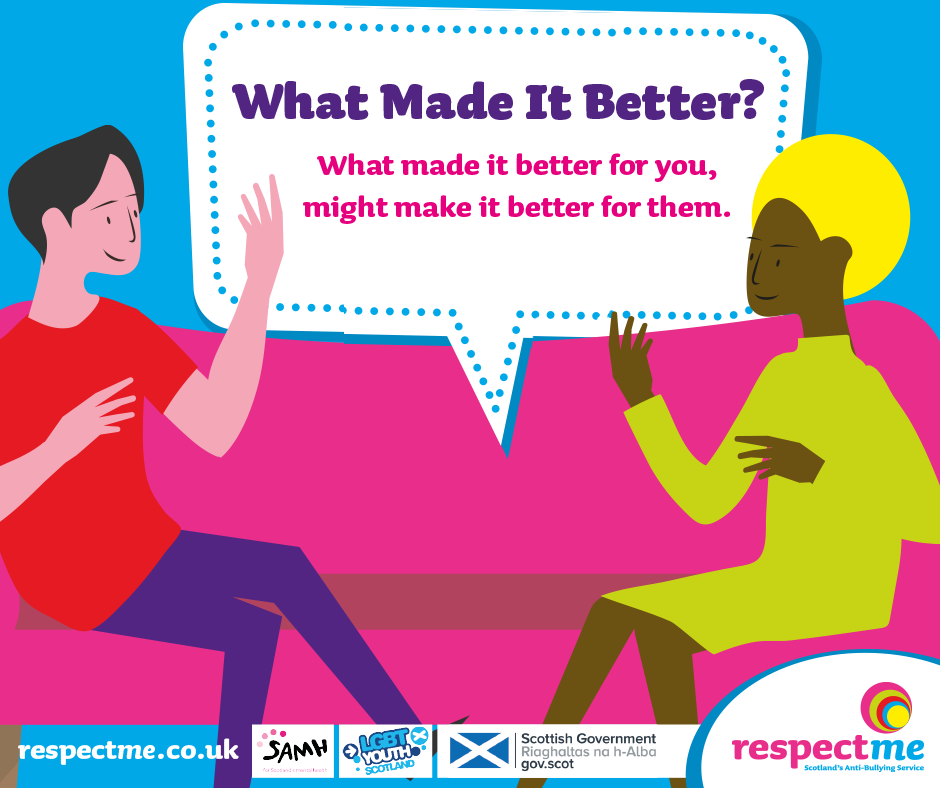The Covid-19 pandemic restrictions have a particular impact on young people, with every aspect of their lives - from school to home to social activities - potentially affected in some way.
It’s well documented that Covid-19 has changed the landscape of bullying. Almost half (47 per cent) of young people in Scotland saw or experienced online bullying during lockdown and 59 per cent witnessed an increase in prejudice-based posts, comments and/or attitudes (these findings are from Time for Inclusive Education). Online bullying can be particularly relentless as it can happen day and night - there is no “home time”.
With this in mind, a range of free lesson plans, activities, social media graphics and campaign resources have been developed for primary and secondary children to help schools and youth groups approach and guide conversations, available at whatmadeitbetter.com.
Coronavirus: Why schools must focus on wellbeing in this pandemic
Wellbeing: ‘Now, more than ever, schools must be an emotional base’
Pupils’ view of Covid: ‘We didn’t talk about lockdown when school came back’
Tes Scotland podcast: Children’s commissioner on Covid
After lockdown: How to look after pupil wellbeing
Developed by respectme, Scotland’s anti-bullying service, #WhatMadeItBetter? asks children, young people and adults who have experienced bullying to share their own advice and approaches as to what made it better for them, or what would have helped. It also provides young people with a platform to lead and feed into anti-bullying solutions.
Tackling bullying in schools
The campaign has been warmly received, and already advice and helpful approaches have been shared from people across Scotland and beyond, with more being shared during Anti-Bullying Week - which starts today - on respectme’s social channels.
These include:
“Being taught from school age that discrimination does exist in the world. Encourage children to be allies to people of colour.”
“Be very clear to children that there are designated adults you can go to who you can trust if you need to talk about any problems. Even if the child is embarrassed to go to someone in person - there could be a way for them to express a personal problem they are facing.”
“What really helped me was understanding that I had done nothing wrong to deserve what I was being subjected to. I also reminded myself that kids who bully are often scared themselves and lash out because of their own fears.”
“You shouldn’t be afraid to ask for help as these things are easier to deal with when you have a more experienced adult’s help. I don’t believe in the idea of ‘good bullying that you can learn from’ but try to not let it get you down and affect who you are and your confidence to achieve what you want in life.”
 Alongside the #WhatMadeItBetter? resources, a new toolkit to help schools run youth-led campaigns against online bullying is now available, developed in partnership with the NSPCC: Think B4 You Type is available at the respectme website.
Alongside the #WhatMadeItBetter? resources, a new toolkit to help schools run youth-led campaigns against online bullying is now available, developed in partnership with the NSPCC: Think B4 You Type is available at the respectme website.
Scotland’s young people are better educated and informed about bullying than ever before but they do need the right environment to succeed. #WhatMadeItBetter? will help empower young people who are being bullied, by giving them the knowledge that they are worthwhile and special - and that things will get better.
Wendy Harrington is director of respectme, Scotland’s anti-bullying service. Stay up to date with the campaign and Anti-Bullying Week activities by following respectme on Facebook and Twitter

 Alongside the #WhatMadeItBetter? resources, a new toolkit to help schools run youth-led campaigns against online bullying is now available, developed in partnership with the
Alongside the #WhatMadeItBetter? resources, a new toolkit to help schools run youth-led campaigns against online bullying is now available, developed in partnership with the